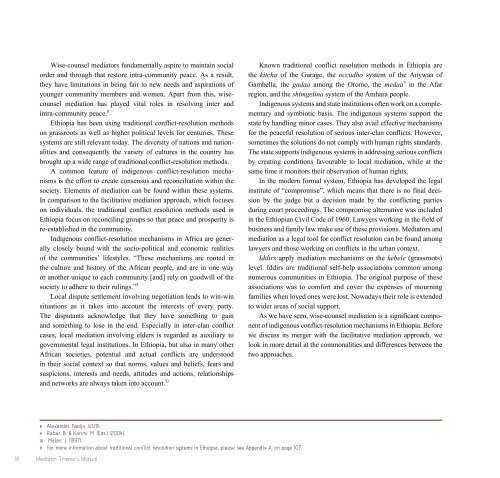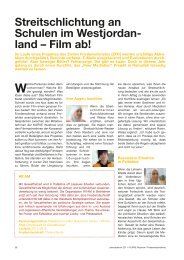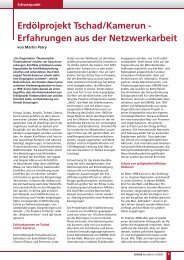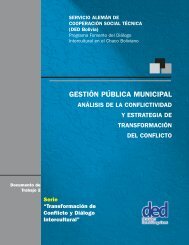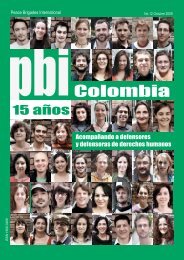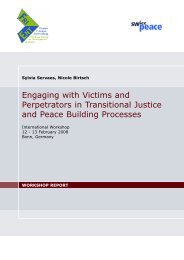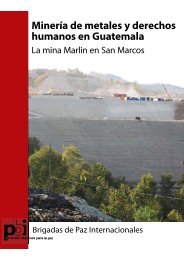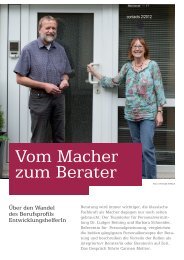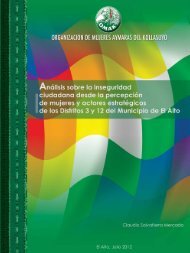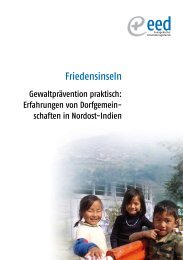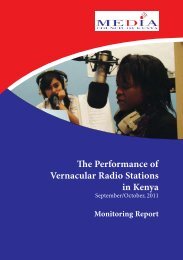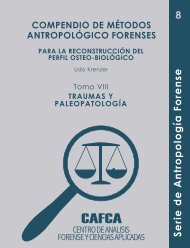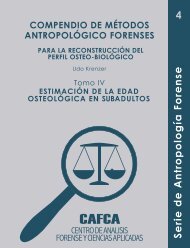Merging Ethiopian Wise-Counsel Mediation and Facilitative ...
Merging Ethiopian Wise-Counsel Mediation and Facilitative ...
Merging Ethiopian Wise-Counsel Mediation and Facilitative ...
- No tags were found...
You also want an ePaper? Increase the reach of your titles
YUMPU automatically turns print PDFs into web optimized ePapers that Google loves.
<strong>Wise</strong>-counsel mediators fundamentally aspire to maintain socialorder <strong>and</strong> through that restore intra-community peace. As a result,they have limitations in being fair to new needs <strong>and</strong> aspirations ofyounger community members <strong>and</strong> women. Apart from this, wisecounselmediation has played vital roles in resolving inter <strong>and</strong>intra-community peace. 8Ethiopia has been using traditional conflict-resolution methodson grassroots as well as higher political levels for centuries. Thesesystems are still relevant today. The diversity of nations <strong>and</strong> nationalities<strong>and</strong> consequently the variety of cultures in the country hasbrought up a wide range of traditional conflict-resolution methods.A common feature of indigenous conflict-resolution mechanismsis the effort to create consensus <strong>and</strong> reconciliation within thesociety. Elements of mediation can be found within these systems.In comparison to the facilitative mediation approach, which focuseson individuals, the traditional conflict resolution methods used inEthiopia focus on reconciling groups so that peace <strong>and</strong> prosperity isre-established in the community.Indigenous conflict-resolution mechanisms in Africa are generallyclosely bound with the socio-political <strong>and</strong> economic realitiesof the communities’ lifestyles. “These mechanisms are rooted inthe culture <strong>and</strong> history of the African people, <strong>and</strong> are in one wayor another unique to each community [<strong>and</strong>] rely on goodwill of thesociety to adhere to their rulings.” 9Local dispute settlement involving negotiation leads to win-winsituations as it takes into account the interests of every party.The disputants acknowledge that they have something to gain<strong>and</strong> something to lose in the end. Especially in inter-clan conflictcases, local mediation involving elders is regarded as auxiliary togovernmental legal institutions. In Ethiopia, but also in many otherAfrican societies, potential <strong>and</strong> actual conflicts are understoodin their social context so that norms, values <strong>and</strong> beliefs, fears <strong>and</strong>suspicions, interests <strong>and</strong> needs, attitudes <strong>and</strong> actions, relationships<strong>and</strong> networks are always taken into account. 10Known traditional conflict resolution methods in Ethiopia arethe kitcha of the Gurage, the occudho system of the Anywaa ofGambella, the gadaa among the Oromo, the medaa 11 in the Afarregion, <strong>and</strong> the shimgelina system of the Amhara people.Indigenous systems <strong>and</strong> state institutions often work on a complementary<strong>and</strong> symbiotic basis. The indigenous systems support thestate by h<strong>and</strong>ling minor cases. They also avail effective mechanismsfor the peaceful resolution of serious inter-clan conflicts. However,sometimes the solutions do not comply with human rights st<strong>and</strong>ards.The state supports indigenous systems in addressing serious conflictsby creating conditions favourable to local mediation, while at thesame time it monitors their observation of human rights.In the modern formal system, Ethiopia has developed the legalinstitute of “compromise”, which means that there is no final decisionby the judge but a decision made by the conflicting partiesduring court proceedings. The compromise alternative was includedin the <strong>Ethiopian</strong> Civil Code of 1960. Lawyers working in the field ofbusiness <strong>and</strong> family law make use of these provisions. Mediators <strong>and</strong>mediation as a legal tool for conflict resolution can be found amonglawyers <strong>and</strong> those working on conflicts in the urban context.Iddirs apply mediation mechanisms on the kebele (grassroots)level. Iddirs are traditional self-help associations common amongnumerous communities in Ethiopia. The original purpose of theseassociations was to comfort <strong>and</strong> cover the expenses of mourningfamilies when loved ones were lost. Nowadays their role is extendedto wider areas of social support.As we have seen, wise-counsel mediation is a significant componentof indigenous conflict-resolution mechanisms in Ethiopia. Beforewe discuss its merger with the facilitative mediation approach, welook in more detail at the commonalities <strong>and</strong> differences between thetwo approaches.8 Alex<strong>and</strong>er, Nadja. (2011).9 Rabar, B. & Karimi, M. (Eds.) (2004).10 Malan, J. (1997).11 For more information about traditional conflict resolution systems in Ethiopia, please see Appendix A, on page 107.14 <strong>Mediation</strong> Trainer’s Manual


